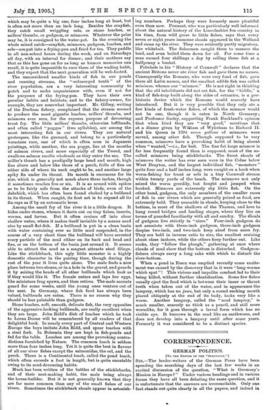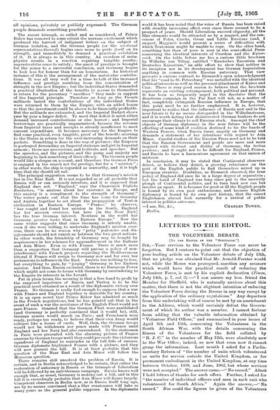GERMAN POLITICS.
Sin.,—The leader-writers of the German Press have been spending the scorching days of the last few weeks in an excited discussion of the question, " What is Germany's Mission in Europe " Under various headings and in various forms they have all been debating the same question, and it is. unfortunate that the answers are irreconcilable. Only one fact stands out quite clearly in all the papers, and indeed in
all opinions, privately or publicly expressed. The German people demands something practical.
The recent triumph, so called and so considered, of Prince Billow has removed to some extent the nervous excitement which produced the harvest of indignant letters on the subject of German isolation, and the German people (or the soi-disant representatives thereof) begins once more to pride itself on its strength, and immediately to demand a practical exhibition of it. It is always so in this country. An overdose of meta- physics results in a reaction requiring tangible results ; imponderabilia cease to satisfy ; the quest of prestige is brought for the nonce to a successful conclusion, and Germany begins to look less for honour than for an honorarium. An historical instance of this is the arrangement of the matricular contribu- tions. It was all very well for a time to talk of the increased influence and prestige resulting from the concentration of strength in the new Empire ; but the individual States demanded a practical illustration of the benefits to accrue to themselves in return for the pecuniary " sacrifices " they made in support of the Imperial principle. Therefore as long as the French milliards lasted the contributions of the individual States were returned to them by the Empire, with an added bonus so that the investment could be shown to be financially profitable. But the milliards are exhausted, and the Imperial Budget shows year by year a larger deficit. To meet that deficit it must either demand increased contributions or else borrow ; and Imperial borrowings are practically unguaeanteed, because the revenue from Imperial taxes and receipts is already insufficient to meet current expenditure. It becomes necessary for the Empire to find some practical, even tangible, proof of the benefits accruing to the States in return for the ever-increasing demands on their pockets. Something is done in the way of pictures : the Emperor is portrayed descending an Imperial staircase and girt in Imperial armour ; there are processions, and festivals, and speeches. But the speeches, and the pictures, and the pomp and majesty are beginning to lack something of their efficacy. The German people would like a cheque on account, and therefore the German Press is engaged in the search not for prestige, but for a " mission " ; in other words, the ship is regarded as seaworthy, and it is high time that she should set sail.
The principal suggestion seems to be that Germany's mission lies in the Near East. It is not regarded as at all probable that Russia will or can seriously interfere, and it is supposed that England dare not. " England," says the Chauvinist Tiigliche Rundschau, "is anxious about her existence in Europe, and this anxiety is a compliment to the strength of Germany." The writer points out that the time has come for Germany and Austria together to set about the propagation of Teuton civilisation in Eastern Europe. " France," ho observes, " has sought and found her mission in the South, England has her mission overseas, but here [in the Near East] lies the true German interest. Nowhere in the world has Germany greater tasks than in Eastern Europe." Now the same writer suggests that since Germany is utterly unable, even if she were willing, to undertake England's mission over- seas, there can be no reason why " petty ' jealousies and dis- agreements should not vanish as between the two great nations. lu other words, the friendship of Germany may be bought by acquiescence in her schemes for aggrandisement in the Balkans and Asia Minor. Even so with France. There is much more than a suggestion that Germany will pursue a policy of non- interference with French projects regarding the Mediterranean littoral if France will resign to Germany now and for ever her pretensions to influence in the East. Austria has nothing to lose, but everything to gain, by "joining" Germany in her Eastern mission. And thus, Russia excluded, there is no European Power which might not come to terms with Germany by surrendering to the Empire its interests in the Levant.
Put in plain terms, the meaning is that a free hand to profit by the supposed impotence of Russia and Turkey is to be the practical asset obtained as a result of the diplomatic victory over France. No German is really fool enough to suppose that a war with France and England together is desirable for his country. It is an open secret that Prince Below has admitted as much in the French negotiations, but he has pointed out that in the event of such a war the assistance of the English Fleet would not save France. Granted that the German Fleet were annihilated (and Germany is perfectly convinced that it would be), still, German armies would march on Paris ; and Frenchmen were ready, perhaps too ready, to believe that their own Army would collapse like a house of cards. Well, then, the German troops would not be withdrawn nor peace made with France until England and her Navy had also surrendered. So the statesmen in Paris were presented with the alarming picture of France overrun by German troops until they could persuade the victorious squadrons of England to surrender in the full tide of success. German diplomats frightened France with a picture, and they will now present the bill. It is at least probable that the question of the Near East and Asia Minor will follow the Moroccan question.
There remains still unsolved the problem of Russia. It is certain, and in Berlin acknowledged to be certain, that either the restoration of autocracy in Russia or the triumph of Liberalism will be followed by an anti-German campaign. Russia knows well enough that, as usual, Germany is making out a bill, and in this bill it is exceedingly probable that Asia Minor will figure largely. Competent observers in Berlin now, as in Russia itself long ago, are by no means convinced that a Slav renaissance will take so many years as the general public supposes. In the diplomatic world it has been noted that the voice of Russia has been raised with steadily increasing effect ever sines there seemed to be a prospect of peace. Should Liberalism succeed oligarchy, all the Slav elements would be attracted as by a magnet, and the con- sensus of Poles, Czechs. Great and Little Russians (and, I suspect, Magyars) would present a series of difficulties with Which Teutonism might be unable to cope. On the other hand, something less than of yore is seen in the semi-official Press concerning the ideutical interests of Czardom and the Kaiser- reich. On the table before me lies a curious little brochure by Wilhelm von Tiling, entitled " Russisches Zarentum and Deutsches Kaisertum," an able effort to show that neither in its inception nor in its development has German Imperialism anything in common with Russian autocracy. That view presents a curious contrast to Bismarck's open acknowledgment that his "road to St. Petersburg" was metalled with the identical political interests as well as the personal attachment of Kaiser and Czar. There is very good reason to believe that the brochure represents an existing estrangement, both political and personal. It has been so frequently urged in the Spectator that the disastrous campaign in the Far East will not, as a matter of fact, completely extinguish Russian influence in Europe, that this point need be no further emphasised. It is, however, important to realise that the influence of Russia now and in the near future is by no means disregarded in the Wilhelmstrasse, and it is worth noting that disinterested German bankers do not encourage their clients to sell Russian stock. Amongst the chief objects of German diplomacy in the near future will be the effecting of some kind of coalition destined to tie the hands of Western Powers, when Russia turns angrily on Germany and demands a statement of her intentions with regard to Asia Minor. Careful readers of the Russian Press need not to be told that the Russian Government and people are more and more inspired with distrust and dislike of Germany, the tertius gaudens ; and it ought not to be difficult for England, France, and Russia to base a harmonious agreement on that unison of mistrust.
In conclusion, it may be stated that Continental observers detect, or believe they detect, a growing reluctance on the part of the English public to find themselves mixed up in European rivalries. Doubtless, as Bismarck observed, the true policy of England did once lie in a large degree of separatism ; but the hand of England was long since put to the unwieldy plough of Continental politics, and to turn back now can but involve an upset. It is because for good or ill the English people is bound by its own past enthusiasms, and because English diplomacy is bound by its own past history, that the sanest Englishmen abroad look earnestly for a revival of public interest in politics out re-user.
—I am, Sir, &c., CHARLES TOWER. Berlin.



































 Previous page
Previous page